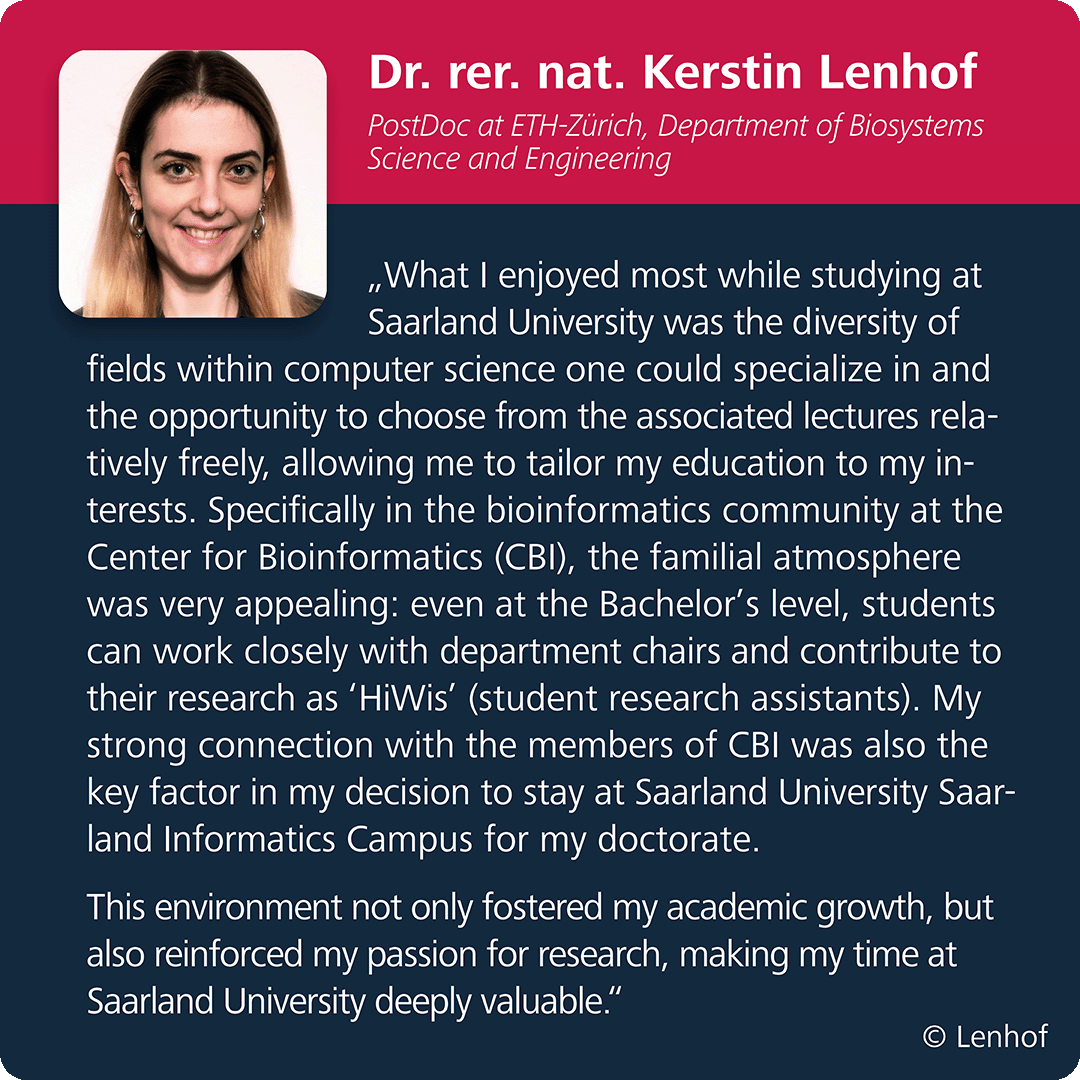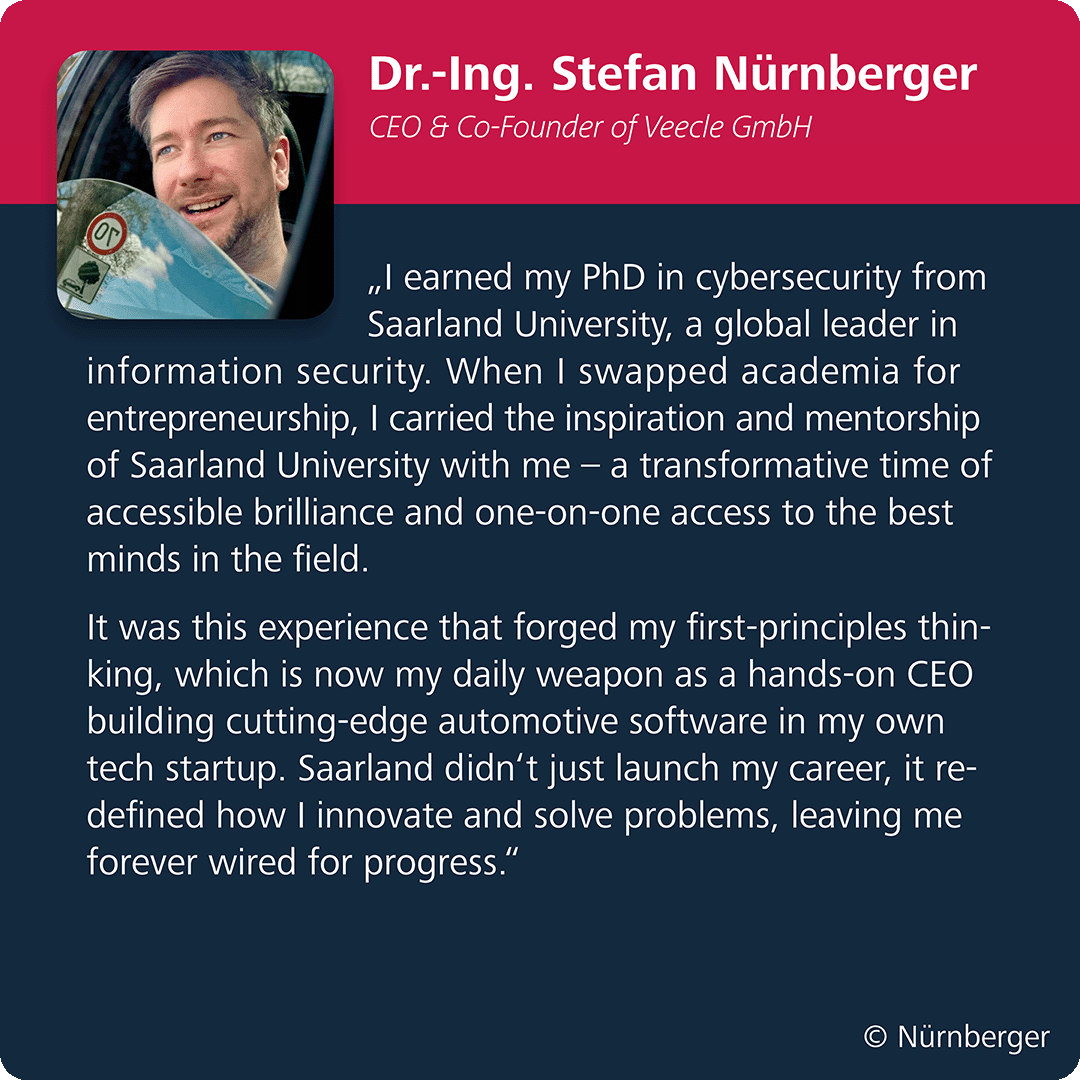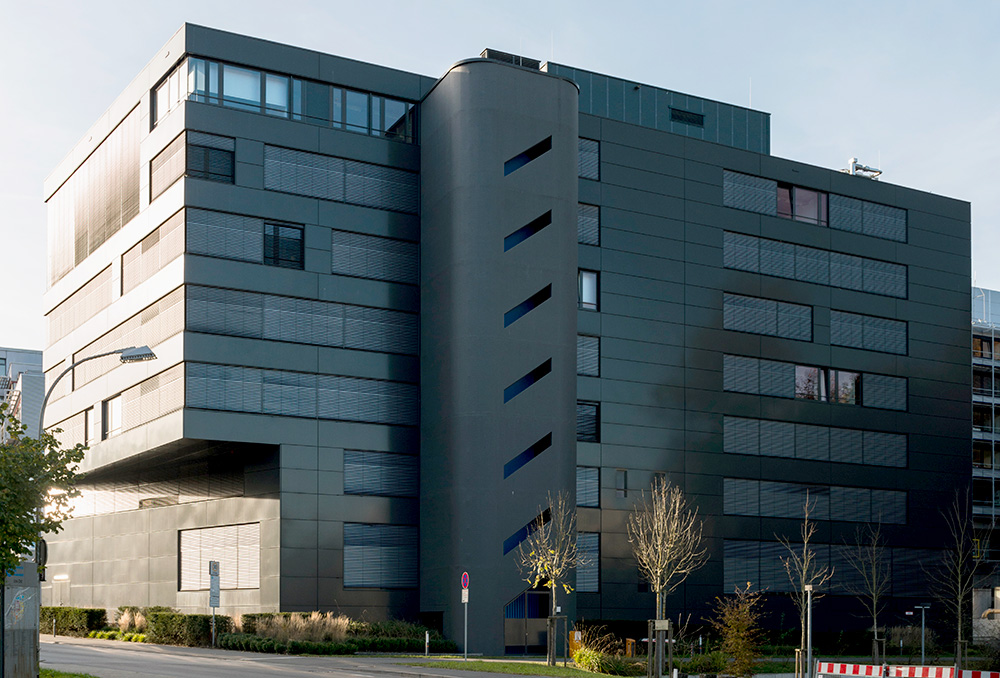Your gateway to an exciting future in tech
Outstanding career prospects in cutting-edge technologies. The demand for graduates with a Master's in computer science has never been higher. With its strong research focus on computer science and as a key partner in the Saarland Informatics Campus (SIC), Saarland University is both an innovative environment in which to study and a great launchpad for your career. Through close collaboration with the Max Planck Institute for Informatics (MPI-INF), the Max Planck Institute for Software Systems (MPI-SWS), the German Research Center for Artificial Intelligence (DFKI), the Helmholtz Center for Information Security (CISPA) and the Center for Bioinformatics (ZBI), you will have the opportunity to learn from and research alongside internationally recognized computer scientists. Keep reading to find out more about the benefits of enrolling in one of the many computer science Master's programmes that Saarland University has to offer.
The Master’s program in Computer Science at Saarland University is recognized internationally, with around 60% of its students coming from abroad. This program offers a conducive environment for those interested in research-based studies in computer science. Areas such as AI, cybersecurity, visual computing, human-computer interaction, and software engineering are among the many subfields of computer science available for students to explore based on their preferences. Through their integration into the Saarland Informatics Campus, students also benefit from the expertise of world-renowned informatics partner institutes.
More information
The Master’s program in Bioinformatics builds on the methodological foundation set by the Bachelor’s program. It incorporates contemporary research topics and creates direct connections with laboratory research at Saarland University and industry collaborations. Students explore areas like genetics, drug research, virology, biotechnology, and medical diagnostics. At the same time, they further develop competencies in computer science, covering data structures, algorithms, artificial intelligence, machine learning, computer graphics, database systems, and software engineering.
More information
The Master’s program in Cybersecurity equips students for roles in both research and industry. Students can specialize in areas such as cryptography, privacy, software security, systems and networks, formal methods, and legal dimensions of cybersecurity. These areas are closely linked with the cutting-edge research undertaken at the CISPA Helmholtz Centre for Information Security. Additionally, the curriculum encompasses related computer science subjects. This program is tailored for those with a Bachelor’s degree in Computer Science, Cybersecurity, or a related domain.
More information
The Master’s program in Data Science and Artificial Intelligence covers areas of data analysis and automation, encompassing topics from mathematics and statistics to machine learning, artificial intelligence, big data, data management, modelling, simulation, and data visualisation. Students engage with relevant problems from computational linguistics, physics, material sciences, chemistry, psychology, and biology. With the importance of handling data appropriately, the program also addresses IT security, legal considerations, data protection, philosophy, and ethics.
More information
Devices such as insulin pumps, pacemakers, high-speed trains, and coffee machines operate with the assistance of small computers termed “embedded systems.” The Master’s program in Embedded Systems serves as a connection between traditional engineering and computer science. It addresses multiple facets of modern, integrated, and embedded systems, and provides students with the opportunity to customize their course content according to their interests. Through collaborative projects between Saarland University and its industrial partners, students can gain exposure to real-world industrial scenarios during their studies.
More information
The Master’s program in Language and Communication Technologies (LCT) integrates foundational, applied, and cognitive research on language processing and technology. The LCT program is backed by a consortium of seven European universities, and students study at two partner institutions, ultimately earning dual degrees. The curriculum encompasses areas such as computational linguistics, psycholinguistics, phonetics, speech science, and speech technology. All instruction and examinations are conducted in English.
More information
The Master’s program in Language Science and Technology merges foundational, applied, and cognitive research related to language processing and technology. Students have the flexibility to select from an extensive array of courses spanning computational linguistics, psycholinguistics, phonetics, speech science, and speech technology, allowing them to customize their study experience according to their personal interests. Recognized for it’s excellent research in computational linguistics and language technology, Saarland University provides students with a vibrant research setting. All courses and examinations are conducted in English.
More information
Many of today’s challenges demand a thorough understanding in both mathematics and computer science. The Master’s program “Mathematics and Computer Science” offers students the opportunity to study both disciplines concurrently and comprehensively. Participants can select from an extensive array of courses spanning both domains. Graduates are not only equipped to excel in traditional roles within mathematics and computer science but also in emerging and dynamic sectors such as e-commerce, automotive engineering, mechanical engineering, healthcare, and telecommunications.
More information
The Master’s program in Media Informatics offers a blend of practical and research-based education within the interdisciplinary domain of media informatics. Students gain analytical, creative, and hands-on insights into software and system design for digital media. In partnership with the University of Fine Arts Saar, the program introduces elements of design. Students participate in courses, undertake a Media Art & Design project, and undergo a practical phase in industry.
More information
The interdisciplinary Master’s program “Visual Computing” provides the broad theoretical and practical expertise needed to create, process and analyse digital images. The lectures and seminars are dedicated to image creation and its geometric foundations, image analysis and synthesis and related fields.
More information
Business informatics investigates and shapes the digitalization processes within business, administration, and society. It assesses the capabilities of emerging information technologies and derives innovative IT and organizational strategies. The field encompasses the development and utilization of information and communication systems in businesses, facilitating digital transformation. As an interdisciplinary domain, it bridges the gap between economics and computer science.
More information
Advisory services
Find the right fit for you!
If you already know what you want to study, you can direct your questions to the departmental representative.
Let's talk!
Not quite sure what you would like to study? The experts at the Central Student Advisory Service offer free, no-obligation consultations to prospective students.
Jump start your career
Ready to begin your Master's journey at Saarland University?
Apply today! We look forward to welcoming you.
How to apply
Doctorate programmes at Saarland University
With its strong focus on research and cutting-edge science, the Saarbrücken Graduate School of Computer Science provides an ideal atmosphere for students looking to pursue internationally competitive doctoral research in computer science. Doctoral candidates have the opportunity to collaborate with internationally renowned researchers working at Saarland University or at one of the numerous research institutes located on or near campus: the Max Planck Institutes, the German Research Center for Artificial Intelligence (DFKI), the Heimholtz Center for Information Technology (CISPA) and the Center for Bioinformatics (ZBI). This unique research environment gives doctoral students the opportunity to collaborate with over 200 postdocs and professors and around 500 fellow PhD students in nearly all areas of computer science.
World-class study programmes – Unlock your potential!
Saarland University is internationally renowned for its research in the field of computer science. Here are just a few exciting reasons why you should choose Saarbrücken.
- Scientific excellence: With over 1000 computer scientists teaching and researching here, Saarbrücken is one of the top locations for computer science in Germany and Europe according to the computer science ranking site CSRankings. Among our team of 56 professors are recipients of the German Future Prize (Zukunftspreis des Bundespräsidenten), the Gottfried Wilhelm Leibniz Prize, the Konrad Zuse Medal, the Philip Morris Research Prize, European Research Council grant funding (ERC) and many other awards. Our doctoral students regularly present their research at high-impact computer science conferences around the world.
- Our international profile: Saarland University is Germany’s only university teaching all its computer science Master’s degrees completely in English starting from day one. This ensures our graduates are ideally prepared for the global job market. With around 57% of our Master’s students coming from abroad and over 80 nations represented, Saarland Informatics Campus (SIC) really is a hotspot for international students.
- Outstanding career prospects: A degree in computer science opens many doors. Graduates can work in the private sector, research, or even found their own start-up. As a part of the EXIST start-up network, Saarland University offers a variety of support and consultation resources for future and budding entrepreneurs. But don’t just take our word for it – the over 800 spin-offs set up over the last ten years speak for themselves!
- Teaching excellence: Saarland University computer science programmes regularly receive top marks from the Germany-wide ranking site CHE-Hochschulranking.
- Outstanding student supervision: The researcher-to-student ratio of one to four is unsurpassed in Germany, making SIC a superb environment for students to learn and develop. Plus, the departmental student organization provides peer-to-peer support and advice to students at every step of the way. Saarland University: the ideal place for your Master's in computer science.
- Funding and scholarships: At the Saarbrücken Graduate School of Computer Science, talented Bachelor’s graduates have the opportunity to begin doctoral studies straight away. In addition to excellent research supervision, these students also receive a scholarship of €800 per month.
- A dynamic and outward-looking region with France and Luxembourg right on the doorstep. Saarbrücken is the state capital of Saarland and the state’s political, economic and cultural centre. Saarbrücken is a vibrant city with a population of 180,000, of which over 30,000 are students. Students in Saarbrücken benefit from moderate living costs and excellent cultural and recreational activities. Paris and Luxembourg City can be reached in just a few hours by train.
Internationally renowned research
Saarland Informatics Campus (SIC) is where first-class research and excellence in teaching meet. Around 1,000 scientists at Saarland University and at SIC's internationally active research institutes are working in 16 forward-focused research fields ranging from artificial intelligence to cybersecurity.
The external research institutes – located on campus or nearby – conduct first-class, internationally respected research in computer science. In addition to various industry partnerships here in Germany, SIC also works with international computer science giants such as Microsoft, Adobe, Intel and Google.
A glance at the rankings shows that SIC is one of the top addresses for computer science, ranking second for research in all of Europe on the CSRankings website. Saarland University itself ranks as one of the top three German universities for computer science.
Since 1988, there has been a steady stream of new partners joining the Saarland Informatics Campus. Keep reading to learn more about the institutes currently represented on campus.
Research institutes at SIC
The German Research Center for Artificial Intelligence (DFKI) is an international leader in AI research. For over 35 years, DFKI has stood at the interface of scientific excellence, real-world applications and social responsibility. With an international team of around 1,500 employees from over 70 countries, DFKI develops trailblazing solutions to today’s problems. DFKI's research covers a very broad spectrum, from fundamental academic research to market-focused product development. DFKI’s size and the volume of external funding that it acquires makes it one of the world’s most important centres of excellence in its field.
Learn more
For over two decades, the Max Planck Institute for Software Systems (MPI-SWS) has been conducting groundbreaking basic research in the development, analysis, modelling and implementation of software systems. The institute also focuses on evaluating complex software architectures. The goal is to develop and improve computer systems that are efficient, reliable, safe and user-friendly. The two Max Planck Institutes on the Saarland Informatics Campus are Germany’s only Max Planck Society research centres for fundamental research in computer science and are recognized as top destinations for computer scientists.
Learn more
The goal of the Max Planck Institute for Informatics is to advance foundational research and drive innovation in key areas of computer science. The research at the institute covers a broad spectrum, ranging from the study of the fundamental principles of algorithms and logic to the study of systems such as the Internet and multimodal areas such as computer vision, computer graphics, databases and information systems, machine learning and artificial intelligence. By integrating these diverse areas and fostering a culture of collaboration, MPI-INF operates at the highest scientific standards and works to shape the computing landscape of tomorrow.
Learn more
Bioinformatics is an interdisciplinary field of research that brings together biology, computer science and other natural sciences. It uses modern computer technologies to carry out biological experiments and analyse the findings. The Center for Bioinformatics (ZBI) plays a key role in designing high-tech experiments and analysing complex data. The research at ZBI has been crucial to improving our understanding of diseases, diagnosing them earlier and treating them in a more targeted manner. The field of bioinformatics has revolutionized biology and transformed it from a descriptive discipline to one powered by data, offering key insights into the life’s most complex processes.
Major research projects
Another highlight of the Saarland Informatics Campus is the major interdisciplinary research projects initiated here. These projects are funded by numerous organizations such as the German Research Foundation (DFG), Google or the Volkswagen Foundation. To learn more about our ongoing large-scale research projects, visit the Saarland Informatics Campus website where you will find information on current research topics, time frames, funding sources and much more.







